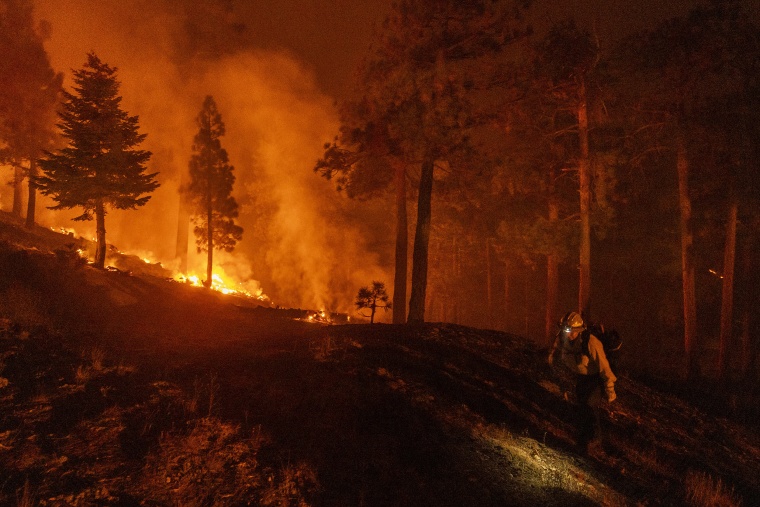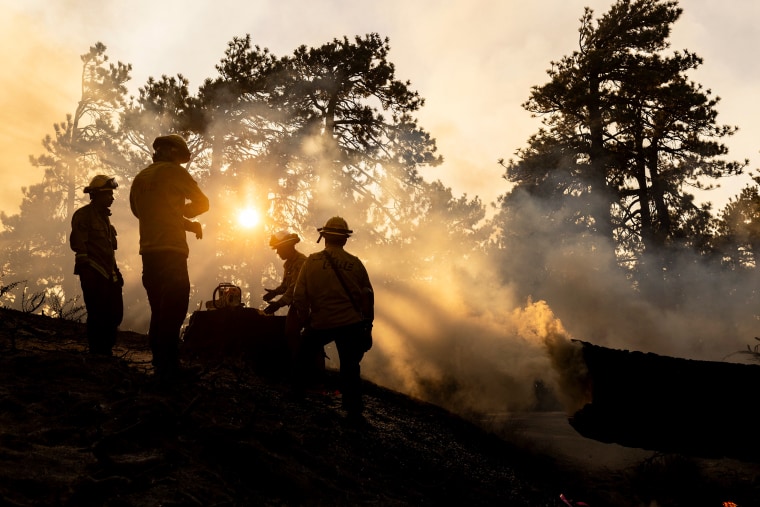Crews battling three major California fires could get some relief from record heat and help from the weather as a cooldown preceded minor containment for the blazes.
The Airport, Bridge and Line fires have collectively burned over 114,000 acres of land in the state since they ignited this month, destroyed more than a dozen of structures and injured at least 15 people, according to the California Department of Forestry and Fire Protection, known as CalFire.
None is fully contained.
A high pressure system that has baked the west for much of September moved eastward and opened the door to cloud cover, ocean breezes, and the possibility of showers. Hot, flame-fanning winds from the desert are dissipating, and the cooler temps may help firefighters give the blaze their best.
Airport Fire
The Airport Fire, which started Monday in the area of Trabuco Canyon, about 55 miles southeast of Los Angeles, expanded to 23,494 acres, according to CalFire.
On Friday, firefighters got their first sign of victory — 9% containment.
“Crews had an outstanding day yesterday,” Craig Covey, operations chief for the blaze, said in a video update Friday. “They were able to put it out, mop it up, and stop the spread.”
Parts of the wildfire were still raging, he said, including sun-exposed sections of the mountains above the marine layer, a lid of cool clouds that has moved in from the Pacific.
“That is extremely steep and challenging country,” Covey said.
In the span of the workweek, high temperatures dove roughly 15 degrees in the area of the Airport Fire.
The fight has also been helped by barren fire scars from past blazes, which have acted as a virtual fence for wayward flames, he said.
Evacuation orders in some areas near the Airport Fire, named for its proximity to a remote-controlled aircraft facility, were downgraded from mandatory to voluntary. Included in the downgrade is Robinson Ranch neighborhood of Rancho Santa Margarita, according to the Orange County Sheriff’s Department.
Authorities were still trying to account for damage as the fire also spread to nearby Riverside County.
“Multiple structures have been either damaged or destroyed across the fire,” a cooperative of fire officials known as unified command said Friday. “Damage assessment teams are assessing the affected areas to determine the extent.”
Bridge Fire
Seventy miles north, along the border between Los Angeles and San Bernardino counties in the San Gabriel Mountains, firefighters registered progress after a few days of alarming growth of the Bridge Fire. It is now 3% contained.
The blaze, which started Sept. 8 near the Bridge to Nowhere, a circa-1936 structure built for a road that never materialized, grew to 52,800 acres Friday to become the largest in the state as it threatened structures in mountain communities east of Los Angeles.
Mountain High, one of three snow resorts in the San Gabriel Mountains, said in a statement Wednesday that its base facilities were intact after the fire marched through it.
In a statement Friday, the fire’s federally operated unified command unit credited “excellent work by firefighters and moderating weather” for stopping the blaze’s expansion.

Los Angeles County Fire Chief Anthony Marrone said Wednesday that 20 homes were destroyed in the Mount Baldy area, and 13 homes were destroyed in the Wrightwood area. Six cabins in the mountains also burned to the ground, he said.
The California Department of Forestry and Fire Protection said in a statement Thursday that “numerous structures in the Wrightwood area have been impacted by the fire, with damage to power infrastructure reported.”
More than 1,000 structures were under threat as mandatory evacuations remained in place for multiple communities, including Wrightwood, home to Mountain High, according to state and federal statements.
Unified command operations Chief Kristian Litz said Friday there were still active flames near Wrightwood and in the community of Big Pine, both at the northern end of the blaze. In those areas firefighters face the steep terrain and forest fuel that could give the fire new life.
At the south end are neighborhoods that are vulnerable to flames, he said. “We are preparing and planning on a full suppression effort,” Litz said.

Line Fire
Also in San Bernardino County, about 40 miles east of the Bridge Fire, firefighters working the mountainous 38,074-acre Line Fire posted leading progress, achieving 25% containment Friday.
On Thursday, unified command officials said more than 65,000 homes were threatened by the blaze. On Friday, unified command Chief Jeremy Pierce said the fire was all but knocked down in the foothills of Highland, near the location of the fire’s start on Sept. 5, and evacuees there were being allowed to return.
“We’re confident that that fire is out in that area,” Pierce said in a video update Friday.
There were still active flames on Keller Peak, about 22 miles northeast of Highland, he said. “We’re going to take advantage of the high humidity, we’re going to take advantage of the lack of wind,” Pierce said.
A suspect, Justin Wayne Halstenberg, 34, was arrested and charged with arson for allegedly starting the fire, county authorities said. Motive was unknown, they said, and it wasn’t clear if he has secured a lawyer for the case. The public defender for San Bernardino did not immediately respond to a request for comment.
Of the fire personnel injured in the three blazes, the Line Fire has been connected to three, all with minor injuries, said Fabian Herrera, spokesperson for the fire’s unified command.
One structure has been destroyed and three others damaged, he said.
Forecast could aid effort
Gov. Gavin Newsom declared a state of emergency and said he has secured federal assistance for residents in the four counties affected by the blazes. He also said mutual aid from Washington, Utah, and North Dakota, including firefighters, were sent to Southern California.
Nearly 6,000 personnel and 60 aircraft, including National Guard aircraft capable of dropping water, have been assigned to help fight the blazes.
The weather outlook should give firefighters the weekend and beyond to battle the three fires without unforgiving temperatures.
A cool, low-pressure system moving in from the Pacific is forecast to reduce temperatures even further, according to the National Weather Service in San Diego, which covers the areas of the fires except Los Angeles County.
But the weekend of Sept. 21, “significant warming” could bring temperatures back to summer norms just as fall arrives, it said.







